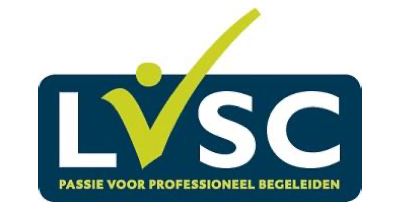
Scope of the Code of Conduct
The code of conduct relates to the professional activities of the members of the LVSC and aims to guarantee the quality of supervision/coaching as carried out by supervisors/coaches (hereinafter to be called: professional counsellor) towards their supervisees/clients and towards the organisations with which these supervisors/coaches have an agreement.
The code of conduct does not apply to work counselling, consultation or other counselling activities that cannot be viewed as supervision or coaching.
1. General
1.0 A professional counsellor must act as befits the proper performance of their professional duties, with the code of conduct serving as a guideline.
1.1 The professional counsellor respects differences in ethnicity, personal beliefs, gender and social status of the client(s).
1.2 The professional counsellor ensures that the client and, if applicable, the organisation are aware of the code of conduct.
2. Counselling Contract with Clients
2.0 Counselling is provided in accordance with a contract agreed between the professional counsellor, client and – if applicable – the instructing party, which means an agreement set out in writing. In some situations there can therefore be two types of counselling contracts.
2.1 Content of the contract
In each counselling contract, at least the following agreements are recorded in writing:
2.1.1 The objectives to be formulated at the start of the counselling, or how the formulation of the objectives is going to take place.
2.1.2 The number, duration, frequency of the agreed sessions, the meeting place, fee (if applicable).
2.1.3 Agreements on confidentiality by the professional counsellor relating to the contributions made by the client.
2.1.4 The evaluation and assessment times as well as the procedures on the basis of which the evaluation and possible assessment are carried out, taking into account the training or work situation of the client. And, depending on the situation:
2.1.5 In the event of group counselling, the professional counsellor requires an undertaking from the clients that they will abide to the duty of confidentiality in respect of the contribution made by fellow clients.
2.1.6 If there is counselling on the instruction of a training institute: – what will be reported by the professional counsellor to the training institute – that the report is discussed with the client before it is submitted to the training institute.
2.1.7 If during counselling a report must be issued on the instruction of an organisation, the contract sets out that, together with the client, the professional counsellor prepares which information shall be provided to the organisation.
2.1.8 If counselling takes place on instruction of a client, there will be no reporting to third parties by the professional counsellor unless the client and professional counsellor deem it useful to inform the organisation by means of a report.
2.2 Counselling contract with training institutes and organisation
2.2.1 The contract between the professional counsellor and a training institute or organisation is based on the code of conduct for LVSC members.
2.2.2 The contract between the professional counsellor and the training institute or organisation sets out: the objective of the counselling, number of meetings, reporting and fee (if applicable).
2.2.3 In contact with an organisation, it is the duty of the professional counsellor to inform him/herself of the policy of the organisation in respect of counselling and, if possible, to contribute to the development of such policy.
3. Confidentiality
3.1 On the basis of entering into a functional relationship of trust with a client, a professional counsellor is under a duty of confidentiality in respect of the knowledge he/she becomes aware of during the counselling.
3.2 On the basis of this duty, the professional counsellor ensures that the material he/she has become aware of is handled in a confidential manner.
3.3 The professional does not enter into contact with third parties on his/her work with the client, subject to the exceptions set out in articles 3.5 and 4.
3.4 The consent of the client does not automatically release the professional counsellor from his/her duty of confidentiality.
3.5 During any legal proceedings a professional counsellor must rely on the right to decline to give evidence. Consultation with colleagues is recommended or possibly consultation with the confidential committee of the LVSC.
3.6 Confidentiality and peer consultation
3.6.1 An exception to the duty of confidentiality set out in article 3 is the situation in which the professional counsellor is of the view that he/she has to consult with colleagues, or deems consultation of experts necessary, who in turn are under a duty of confidentiality. In such cases the professional counsellor shall guarantee the privacy of those to whom the meeting or consultation relates and anonymise the material.
3.6.2 In respect of training institutions where, by the nature of the situation, familiarity with the client is usually substantial, the professional counsellor must make efforts to ensure that very careful ground rules are set out in respect of consultation situations where the study results of clients are discussed. The professional counsellor must ensure that what is discussed in respect of the results of the consultation does not prejudice the privacy of the client. The professional counsellor must discuss what he/she is going to raise for discussion with the client in advance.
3.6.3 In situations where the interests of the client are at stake and the professional counsellor would benefit from consultation, it is recommended to consult a (colleague) registered supervisor or coach or an expert, or possibly the confidential committee of the LVSC.
3.7 Confidentiality and social media
3.7.1 The above provisions also apply to the use of social media.
4. Release from the Duty of Confidentiality
4.0 The professional counsellor can be made aware of information that brings him/her into conflict with his/her duty of confidentiality. Situations may occur where vital interests of the clients or others could be seriously prejudiced. The professional counsellor may consider him/herself released from his/her duty of confidentiality if all the conditions set out under 4.1 up to and including 4.3 have been observed:
4.1 If not lifting the duty of confidentiality leads to a violation of the physical and/or psychological integrity of the client or others.
4.2 If without lifting of the duty of confidentiality, the relevant problem appears unsolvable.
4.3 If the professional counsellor has done his/her utmost to disclose the relevant informationpossibly together with the client.
4.4 If the professional counsellor has the intention to lift the duty of confidentiality, he/she must,in order to test the conditions set out under 4.1 up to and including 4.3, consult with a (colleague) registered supervisor or coach. The professional counsellor notifies the client of this.
4.5 If, after the consultation referred to in 4.4, the professional counsellor decides to lift the duty of confidentiality, he/she must, before proceeding, notify the client of this.
5. Professionalism and Integrity
5.1 Professional counsellor
5.1.1 A professional counsellor may not have, or enter into, friendship, sexual, or otherwise non- professional relationships with clients.
5.1.2 The professional counsellor is deemed to have asked the client for only such information thatis relevant for the specific counselling.
5.1.3 The professional counsellor avoids professional dual roles as far as possible. Where dual rolesare unavoidable, they are made clear and used with care so that the interest of the client isnot prejudiced.
5.2 Reference: if the situation or queries of the client fall outside the learning objectives of counselling, the client must be referred to the most appropriate help and/or assistance. Theprofessional counsellor accounts for this referral decision towards the client.
5.3 Handling counselling material: After the end evaluation, the material supplied by the client is destroyed unless otherwise agreed. The professional counsellor may keep his/her own notes, evaluation and assessment details. This information must be destroyed after three years.
6. Sanctions
6.0 Subscribing to the LVSC code of conduct is a condition for membership of the LVSC. If a supervisor/coach does not observe the provisions of the code of conduct, interested parties can lodge a complaint with the Disciplinary Committee.
The powers of the Disciplinary Committee and the procedures to be followed for the submission and handling of complaints are set out in the regulations of the Disciplinary Committee.
7. Evaluation
7.0 It is the responsibility of LVSC to regularly review this code of conduct and further develop it on the basis of experience.
The code of conduct is reviewed every five years.
LVSC Code of Conduct February 2016

